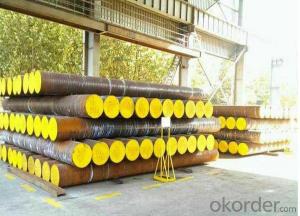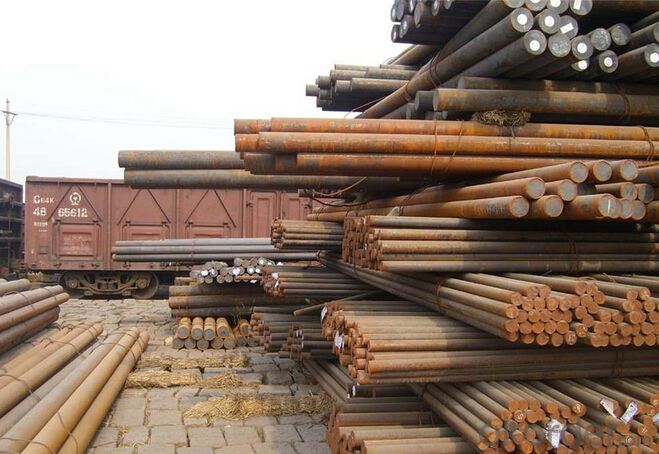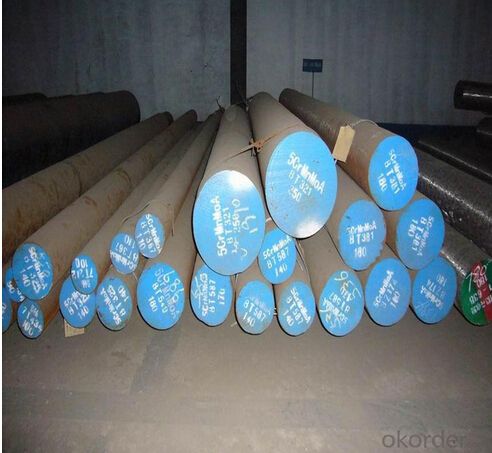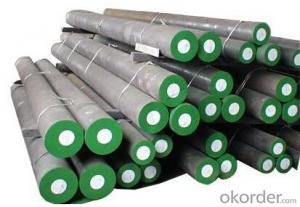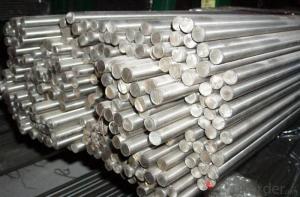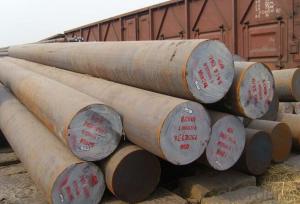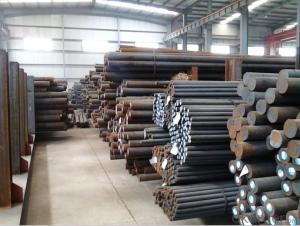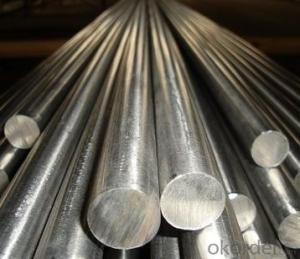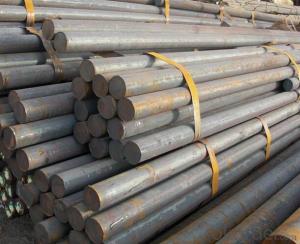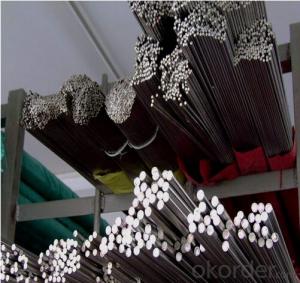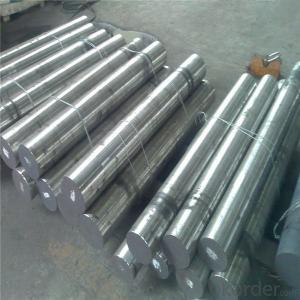Alloy Steel TC105 Special Steel Carbon Steel
- Loading Port:
- China main port
- Payment Terms:
- TT OR LC
- Min Order Qty:
- 25 m.t.
- Supply Capability:
- 10000 m.t./month
OKorder Service Pledge
OKorder Financial Service
You Might Also Like
Specification
Chemical Composition%
| Country | Standard | C | Si | Mn | Cr | S | P |
| China(GB) | T10A | 0.95-1.04 | ≤0.35 | ≤0.40 | - | ≤0.030 | ≤0.030 |
| USA(ASTM) | W110 | 0.95-1.10 | ≤0.35 | ≤0.35 | ≤0.20 | - | - |
| Germany(DIN) | 1.1645 | 1.00-1.10 | 0.10-0.30 | 0.10-0.35 | - | ≤0.030 | ≤0.030 |
| Japan(JIS) | SK105 | 1.00-1.10 | 0.15-0.35 | 0.15-0.50 | ≤0.30 | ≤0.030 | ≤0.030 |
Available Size
| Rolled flat steel | 20-100mm×205-600mm×L |
| Forged flat steel | 110-300mm×400-600mm×L |
Heat Treatment
| Item | Temperature ℃ | Hardness |
| Anneal | 750-760℃ | ≤210HB |
| Quenching | 770-790℃ | 62-64HRC |
| Tempering | 160-250℃ | 58-62HRC |
Characterstics
| 1.Low quenching temperature | ||||||
| 2.Higher hardness and abrasion resistance after heat treatment | ||||||
| 3.poor hardening ability and notable deformation |
Applications: Suitable for cold working dies and plastic moulds with simple shape


1, Your advantages?
professional products inquiry, products knowledge train (for agents), smooth goods delivery, excellent customer solution proposale
2, Test & Certificate?
SGS test is available, customer inspection before shipping is welcome, third party inspection is no problem
3, Payment Terms?
30% TT as deposit and 70% before delivery.
Irrevocable L/C at sight.
4, Trading Terms?
EXW, FOB, CIF, FFR, CNF
6, After-sale Service?
We provides the services and support you need for every step of our cooperation. We're the business partner you can trust.
For any problem, please kindly contact us at any your convenient time.
We'll reply you in our first priority within 24 hours.
- Q: What are the non-destructive testing methods used for special steel?
- Some of the non-destructive testing methods used for special steel include ultrasonic testing, magnetic particle testing, liquid penetrant testing, and radiographic testing. These methods allow for the detection of defects, cracks, or other imperfections in the steel without causing any damage to the material itself.
- Q: How are nickel-based alloys used in the aerospace industry?
- Nickel-based alloys are extensively used in the aerospace industry due to their exceptional strength, heat resistance, and corrosion resistance properties. These alloys are commonly used in the manufacturing of various aerospace components such as turbine blades, combustion chambers, and exhaust systems. Their high temperature stability allows them to withstand extreme conditions in jet engines, while their corrosion resistance ensures longevity and reliability. Additionally, nickel-based alloys also contribute to weight reduction in aircraft, as they possess a high strength-to-weight ratio, making them an ideal choice for enhancing fuel efficiency and overall performance in the aerospace industry.
- Q: How does special steel contribute to reducing product downtime?
- Special steel contributes to reducing product downtime by offering enhanced mechanical properties such as increased strength, hardness, and wear resistance. This allows components made from special steel to withstand harsh operating conditions, reducing the likelihood of breakdowns or failures. Additionally, special steel can be tailored to specific applications, ensuring optimal performance and longevity. By using special steel in the manufacturing process, products are more reliable, have longer service lives, and require less frequent maintenance, leading to reduced downtime and improved productivity.
- Q: What are the factors that affect the wear resistance of special steel?
- There are several factors that affect the wear resistance of special steel, including the composition of the steel itself, the hardness of the steel, the presence of any alloying elements, the microstructure of the steel, and the heat treatment process used. Other factors such as the type and intensity of the wear, environmental conditions, and lubrication also play a role in determining the wear resistance of special steel.
- Q: What are the environmental benefits of using special steel?
- Special steel, also known as alloy steel, offers several environmental benefits. Firstly, it has a longer lifespan compared to conventional steel, reducing the need for frequent replacements and minimizing the associated resource consumption and waste generation. Secondly, special steel is often manufactured using recycled materials, thereby reducing the demand for new raw materials and the energy required for extraction and processing. Additionally, its high strength and durability enable the production of lighter structures and components, leading to lower transportation and fuel consumption. Lastly, special steel can be recycled at the end of its life, further reducing waste and the environmental impact associated with its disposal.
- Q: What are the different defense grades of special steel?
- The different defense grades of special steel typically include grades such as AR200, AR400, AR500, and AR600, which are commonly used for protective armor and structural applications. These grades have varying levels of hardness, strength, and resistance to abrasion, making them suitable for different levels of defense against impacts, wear, and penetration.
- Q: How does molybdenum improve the performance of special steel?
- Due to its unique properties and characteristics, molybdenum is crucial in enhancing the performance of special steel. Its role is multi-faceted and includes improving strength and toughness, increasing hardenability, enhancing corrosion resistance, and improving high-temperature strength and creep resistance. One of the primary benefits of molybdenum is its ability to significantly improve the strength and toughness of steel, making it more durable and resistant to deformation. This is achieved by forming a solid solution with iron, resulting in a fine-grained microstructure and reducing the formation of brittle phases in the steel. Another advantage of molybdenum is its impact on the hardenability of steel. It allows the steel to be heat-treated to achieve the desired mechanical properties. This is particularly important in the production of special steel, where high strength, wear resistance, and thermal stability are often required. By enabling effective heat treatment, molybdenum ensures that the steel can be processed to meet specific performance requirements, such as hardness, toughness, and dimensional stability. Moreover, molybdenum enhances the corrosion resistance of special steel, making it suitable for challenging environments. It forms a protective oxide layer on the steel's surface, acting as a barrier against corrosive substances like acids, alkalis, and salts. This corrosion resistance is crucial in applications where the steel is exposed to harsh conditions, such as marine environments, chemical processing plants, and oil and gas industries. Furthermore, molybdenum improves the high-temperature strength and creep resistance of special steel. It enables the steel to maintain its mechanical properties even at elevated temperatures, making it suitable for applications where the steel is subject to prolonged exposure to heat or mechanical stress. In conclusion, molybdenum plays a vital role in enhancing the performance of special steel by improving its strength, toughness, hardenability, corrosion resistance, and high-temperature properties. These attributes make molybdenum an essential alloying element in the production of special steel for various industries, including automotive, aerospace, energy, and tool manufacturing.
- Q: What are the different heat treatment methods for special steel?
- There are several heat treatment methods for special steel, including annealing, normalizing, quenching, tempering, and case hardening. Annealing involves heating the steel and then slowly cooling it to relieve internal stresses and improve its ductility. Normalizing is a similar process but involves cooling the steel in still air to achieve a more uniform structure. Quenching is a rapid cooling process that results in a hardened steel with increased strength and hardness. Tempering involves reheating the hardened steel to a specific temperature to reduce its brittleness and improve toughness. Finally, case hardening is a process where only the surface of the steel is hardened, while the core remains relatively soft, resulting in a tough and wear-resistant material.
- Q: How does special steel contribute to the automotive sector?
- Special steel plays a significant role in the automotive sector by contributing to the manufacturing and performance of various automotive components. It offers several benefits that enhance the overall quality, durability, and safety of vehicles. Firstly, special steel is known for its exceptional strength and toughness. This makes it ideal for producing critical automotive parts such as engine components, chassis, suspension systems, and safety reinforcements. These components require high strength to withstand the stresses and strains experienced during vehicle operation, ensuring the safety of passengers. Furthermore, special steel provides excellent resistance to wear, corrosion, and high-temperature environments. This makes it suitable for manufacturing parts like gears, bearings, shafts, and exhaust systems, which are exposed to harsh conditions. The use of special steel in these components improves their lifespan, reliability, and overall performance, reducing maintenance and replacement costs for vehicle owners. Moreover, special steel enables the lightweighting of vehicles. Automakers are constantly striving to reduce the weight of vehicles to enhance fuel efficiency and reduce emissions. Special steel alloys, such as high-strength low-alloy (HSLA) steel, offer a unique combination of strength and lightweight properties, allowing manufacturers to design lighter and more fuel-efficient vehicles without compromising on safety or performance. In addition to its mechanical properties, special steel also contributes to the automotive sector through its versatility in manufacturing processes. It can be easily formed, welded, and machined, enabling complex shapes and designs for automotive parts. This flexibility enhances the design possibilities and allows for innovative solutions to meet the evolving needs of the automotive industry. Overall, special steel plays a crucial role in the automotive sector by providing strength, durability, and lightweight properties to various components. Its use in critical parts ensures the safety of vehicles and passengers, while its resistance to wear and corrosion improves the longevity and performance of automotive systems. With the constant drive for fuel efficiency and innovation in the automotive industry, special steel continues to be an essential material in shaping the future of automobiles.
- Q: Can special steel be used in the solar panel manufacturing industry?
- Yes, special steel can be used in the solar panel manufacturing industry. Special steel, such as stainless steel or high-strength steel, is often utilized in the construction of solar panel frames, mounting structures, and other supporting components due to its durability, corrosion resistance, and mechanical properties.
Send your message to us
Alloy Steel TC105 Special Steel Carbon Steel
- Loading Port:
- China main port
- Payment Terms:
- TT OR LC
- Min Order Qty:
- 25 m.t.
- Supply Capability:
- 10000 m.t./month
OKorder Service Pledge
OKorder Financial Service
Similar products
Hot products
Hot Searches
Related keywords
